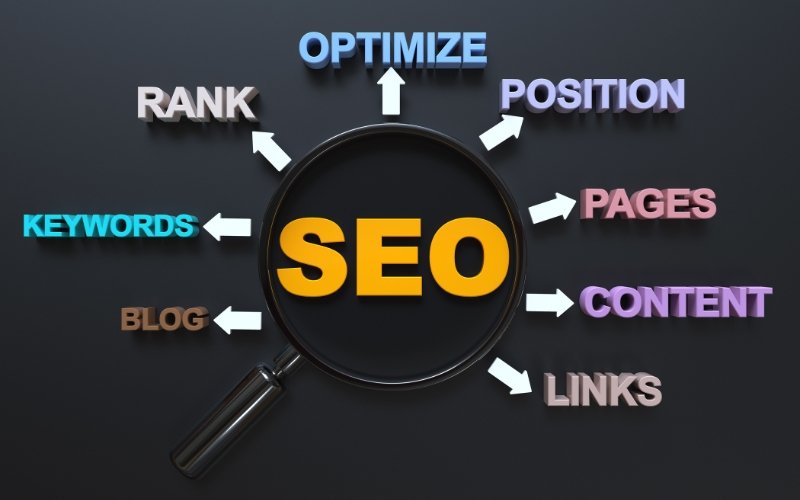In today’s fast-paced digital world, businesses need to be highly visible online to attract traffic and stay competitive. One of the most effective ways to achieve this visibility is by integrating a strong blogging strategy into your Search Engine Optimization (SEO) efforts. Blogging plays a vital role in driving organic traffic, building authority, and keeping your website fresh and relevant in search engine rankings. In this article, we’ll explore seven reasons why blogging should be a cornerstone of your SEO strategy.
Regular Content Creation Enhances Search Engine Visibility

Search engines prioritize websites that regularly update their content. By maintaining an active blog, you consistently provide new and relevant content for search engines to crawl. This helps signal to search engines like Google that your website is active, valuable, and up-to-date. Frequent updates give search engines more opportunities to index your pages, improving your overall visibility.
Blogging also helps you target specific keywords that potential customers are searching for. When you create blog posts that answer relevant questions or solve problems within your industry, you naturally incorporate keywords that search engines associate with your niche. These keyword-rich posts help boost your ranking on search engine results pages (SERPs) by making your website more relevant to search queries.
Moreover, blogging gives you the chance to address seasonal trends, industry updates, or newsworthy events, ensuring that your content remains timely and relevant, further enhancing your site’s visibility.
Blogs Help Target Long-Tail Keywords
While targeting broad keywords is important, focusing on long-tail keywords can offer even greater SEO benefits. Long-tail keywords are more specific and less competitive, making it easier for your site to rank higher for these search terms. Blogging allows you to focus on these niche topics, which helps attract more targeted traffic.
For example, instead of trying to rank for a broad term like “fitness tips,” a blog post could target a more specific long-tail keyword like “fitness tips for busy professionals” or “at-home fitness routines without equipment.” These long-tail keywords are more likely to convert because they match the specific needs of your audience, bringing in visitors who are closer to making a purchasing decision.
By writing blog posts that answer specific, detailed questions, you increase the likelihood that search engines will recognize your content as the best match for these more focused search queries.
Boost Internal Linking Opportunities

Internal linking is an important yet often underutilized SEO strategy. Internal links are hyperlinks that point from one page of your website to another. They help search engines understand the structure of your site and how different pages relate to each other. Blogging provides ample opportunities for creating internal links that improve both user experience and SEO.
When you write a new blog post, you can include internal links to other relevant pages on your website. These could be links to other blog posts, cornerstone content, product pages, or service descriptions. This not only helps search engines crawl and index your site more effectively but also keeps users on your site longer, as they click through related content.
Internal links help to distribute link equity (or “SEO juice”) throughout your site, making it easier for important pages to rank higher in search results. By guiding visitors to additional valuable content on your site, you increase engagement, which is another factor that search engines consider when determining your rankings.
Blogs Increase User Engagement and Dwell Time
Another important ranking factor that search engines consider is user engagement, which includes metrics such as dwell time—the amount of time users spend on your site. When visitors find your blog posts valuable, they are more likely to stay longer to read the content, explore related articles, or engage with your website in other ways.
High-quality, informative blog posts can increase dwell time, signaling to search engines that your site offers valuable content. The longer a visitor stays on your site, the more positive the signal sent to Google and other search engines, which can boost your rankings. Additionally, blogs encourage user interaction, such as leaving comments, sharing posts on social media, or subscribing to your newsletter—all of which contribute to increased engagement.
Engaged readers are also more likely to return to your website, turning into repeat visitors or loyal customers. This not only improves your SEO metrics but also strengthens your relationship with your audience.
Blogging Builds Backlinks and Domain Authority
Backlinks, or inbound links from other websites, are one of the most valuable aspects of SEO. When reputable websites link back to your content, it signals to search engines that your site is trustworthy and authoritative. This can significantly boost your domain authority and improve your rankings.
Blogging creates opportunities for building these backlinks by offering valuable, shareable content that others will want to reference. For example, if you publish a blog post that offers expert insights or data-backed advice, other bloggers, journalists, or industry leaders may link to your post as a credible source. The more high-quality backlinks your site receives, the more authority it gains in the eyes of search engines.
This process can be especially beneficial if you focus on creating “evergreen” content—content that remains valuable and relevant long after it’s published. Evergreen blog posts can continue to attract backlinks and traffic over time, further strengthening your SEO strategy.
Enhances Social Media Engagement and Sharing

While SEO primarily focuses on improving search engine rankings, social media plays an important role in driving traffic to your blog and website. Every blog post you publish is an opportunity to share content across social media platforms like Facebook, Twitter, LinkedIn, and Instagram. By promoting your blogs on these platforms, you can drive more traffic back to your website, increase brand visibility, and potentially earn backlinks.
Engaging and valuable blog content is more likely to be shared by your audience, which can extend your reach and help attract new visitors. When your blog posts get shared widely, they not only generate direct traffic but also enhance your website’s overall credibility and social signals. While social media shares themselves don’t directly influence SEO rankings, the increased traffic and user engagement they generate can indirectly improve your search engine performance.
In addition to sharing blog posts, your social media audience can interact with your content through likes, comments, and shares, further increasing engagement and creating a community around your brand.
Establishes Authority and Trust with Your Audience
In addition to improving SEO, blogging plays a key role in establishing your brand’s authority and building trust with your audience. When you consistently publish high-quality, informative content, you position yourself as an expert in your industry. This authority can lead to increased trust from your readers, who are more likely to become loyal customers or clients.
Search engines, particularly Google, reward websites that demonstrate expertise, authority, and trustworthiness (often referred to as E-A-T). Blogging regularly gives you the platform to showcase your knowledge and insights, which can help your site rank higher in search results. When visitors find your blog useful and reliable, they are more likely to return to your site, share your content, and engage with your business.
In turn, building a reputation for authority and trust through blogging not only boosts SEO but also helps drive conversions. As users continue to engage with your brand and see you as a thought leader, they are more likely to take the next step, whether that’s making a purchase, booking a consultation, or signing up for your services.
Conclusion
Blogging is a powerful tool that goes beyond simply providing content—it is a critical element of a successful SEO strategy. By creating fresh content regularly, targeting long-tail keywords, improving internal linking, increasing user engagement, and building backlinks, you set the foundation for higher search engine rankings and sustained traffic growth.
Incorporating a well-planned blog into your SEO efforts will help you establish authority, engage with your audience, and improve your website’s overall performance. Whether you’re a small business or an established enterprise, making blogging a key part of your SEO strategy is essential to staying competitive in today’s digital landscape.

